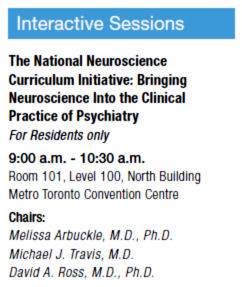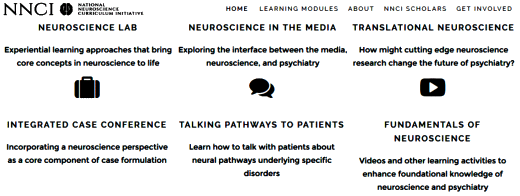
 [The Future of Psychiatry as Clinical Neuroscience: Why Not Now?], and I’ll pick up where I left off there. In March, I called my post "yellow brick roads" because it reminded me of Dorothy and friends heading off to Oz filled with great hope only to discover that Oz the Magnificent was a huckster. This time, my image was of that poignant scene from Caberet, where the beautiful blonde boy sings "Tomorow Belongs To Me."
[The Future of Psychiatry as Clinical Neuroscience: Why Not Now?], and I’ll pick up where I left off there. In March, I called my post "yellow brick roads" because it reminded me of Dorothy and friends heading off to Oz filled with great hope only to discover that Oz the Magnificent was a huckster. This time, my image was of that poignant scene from Caberet, where the beautiful blonde boy sings "Tomorow Belongs To Me."

NIMH: Director’s Blogby Tom InselMay 15, 2015…Until recently these young physician-scientists often discovered that their residency training was completely disconnected from their rigorous scientific background. Psychiatry training comprised required instruction on psychodynamic theory, psychopharmacology, and psychotherapy but little that linked to their interests in brain circuits or brain function. Faculty taught largely what they were taught twenty years ago. There were exceptions—NIMH supports several residency programs to offer research tracks for a few residents to pursue science during their clinical training years—but for most young psychiatrists, training in 2015 is hardly different from training in 1995.
A small band of psychiatrists who are involved in residency training, led by David Ross at Yale, Melissa Arbuckle at Columbia, and Michael Travis at Pittsburgh, set out to change this with the creation of the National Neuroscience Curriculum Initiative [NNCI]. This online set of teaching modules is grounded in principles of adult learning and innovative teaching methods. Take a look at http://www.nncionline.org . You can see the case conferences, experiential learning modules, and a course on neuroscience in the media that the NNCI uses as a toolkit to help residents navigate the new world of brain science.
Why would residents want to know about modern clinical neuroscience? After all, there are very few useful neuroscience-based diagnostic tests or treatments. What Dr. Ross and his colleagues discovered was a hunger for the information from modern brain science. At the annual meeting of residency training directors, the NNCI workshop has been a standing room only event for the past two years. Over 200 individuals from around the country have signed up to be part of the NNCI “learning collaborative,” a group that helps test and develop teaching materials, and more than 25 residency programs have incorporated NNCI material into their training.
It’s true that most of the neuroscience and genomics findings are not yet actionable for psychiatry. No one doubts that the brain is the organ of affect and behavior, but no one can point to a biomarker that is essential for clinical practice. In the short-run, we may do much more to bend the curve on suicide mortality by changing public policy [such as through restricting access to means] rather than finding a biomarker for suicidality. But in the long-run, and we need a long-run strategy, policy will hit a wall and we will need better diagnostics and therapeutics. That is where this new initiative can make a difference. The research of 2015 suggests that the clinician of 2025 and certainly the clinician of 2035 will need to know about cortical dynamics, neural networks, and genomic variation. Those entering the field today will need to know how to think about the brain and how to critique brain science. By changing the training of the next generation, we not only prepare for the future, we create it.
"INTEGRATING A MODERN NEUROSCIENCE PERSPECTIVE INTO EVERY FACET OF CLINICAL PRACTICE,"
"The overarching goal is that residents will incorporate a modern neuroscience perspective as a core component of every formulation and treatment plan and bring the bench to the bedside."
"This module is designed to highlight how clinicians can integrate a neuroscience perspective directly into patient care. Each session will begin by reviewing current theories regarding the neurobiological and/or genetic underpinnings of a particular psychiatric disorder. We then use role-play exercises in order to help residents incorporate relevant neuroscience into their own emerging clinical “voice”. In addition, we demonstrate how this knowledge can inform [and in some cases transform] our understanding of patients, their symptoms and potential treatment options. We also discuss how this approach may be used to potentially strengthen the process of therapeutic communication. "
So my version of this story is very different from his. The way I read it, Dr. Insel who has never practiced psychiatry and has spent his career either in a lab or directing research programs thinks that clinical psychiatry is about dealing with brain disease and has used his position at the NIMH to press that opinion for his thirteen year tenure. He wanted to change psyciatry into a brain-based Clinical Neuroscience from the outset and set out a grandiose scheme about how that might go. He allocated generous funding to the APA’s similar effort with the DSM-V in a series of quickly forgotten symposiums. He’s been extremely controlling in directing funding towards that goal in all of the NIMH dealings. In spite of a lackluster record throughout his reign, he continues to pursue his dream. When the DSM-V flopped, he fled to his as-yet-unknown RDoC program. Now he’s funding and shepherding a program to implement his Clinical Neuroscience in the training of psychiatry residents. Like the DSM-V Task Force, he’s still championing it as if it’s a reality instead of an already tired term for untold millions of research dollars wasted. And now the NIMH has granted the NNCI $150,000 to teach people how to talk the Clinical Neuroscience talk to patients pretending that it’s backed by solid science.
This very much reminds me of my religious denomination. We have suffered turmoil for many years as different groups have tried to dominate the discussion. Having been defeated the liberal wing of the church stated that we had won the day, but that they controlled the education system and would prevail.
They were correct. Starting in the seminaries they indoctrinated young students to their belief system. Changed the desired credentialing system to make a PhD the new standard and then turned these very young immature ministers loose on unsuspecting congregations.
These young people view themselves as superior to their staffs and congregations and use the term Doctor at every turn when they expect a challenge. They have been taught that they are to lead and not do; failure is the result of others not following, or putting in the effort necessary, to complete the task they have assigned.
I see the focus of Dr. Insel, and others, as very much the same. Train young doctors to believe they are on the edge of a brave new frontier, discredit those who have opposing views, and usher in this brave new world.
Failure is the result not of bad science but of others not understanding or following through with the “proper” treatment.
Dr. Insel is following a proven academic system to achieve what he views as success: the acceptance of his ideas on mental health. The difficulty is fighting the large number of new doctors who will follow in his footsteps believing they have been taught the very latest in mental health science when they have been taught only a theory.
Steve Lucas
To me, what this means is patients will be hearing different jargon-laden contentless doubletalk in psychiatric treatment. Trust will continue to erode.
Wow, researching “neural pathways underlying specific disorders” – what a waste of time and money. There is no solid science nor reliable biomarkers underlying pseudo-disorders like “schizophrenia” or “bipolar”. Human emotional distress in all its varieties isn’t reducible to these simplistic categories. Therefore, no consistent neural pathways for these illusory “specific disorders” will be found.
But there is a purpose to this research: To promote an illusion of validity/reliability underlying psychiatric diagnoses, and to keep this wool over people’s eyes as long as possible so that psychiatrists and neuroresearchers can keep their jobs.
Well we need something to replace the now debunked “chemical imbalance” verbiage we give patients. “Cortical dynamics” and “neural networks” and “genomic variation” sure sound cool to me! Kind of reminds me of “psychodynamics” and “object relations” and “twists of fate”.
Yes, it’s loads more sciencey than chemical imbalance — so last century.
So, if I am depressed about my baseball team playing horribly this weekend, that is no longer due to a chemical imbalance but should be referred to the terms that Tom references such as cortical dynamics?
AA,
“So, if I am depressed about my baseball team playing horribly this weekend, that is no longer due to a chemical imbalance but should be referred to [as]”
Lets dust off the old bio-psycho-social model. Lets dust off formulation period! Diagnosis should be the beginning of understanding not the end. I find an appreciation of this increasingly missing in residents etc coming into practice. At least the B-P-S model by filtering the patients experience through 3 different lenses makes overt the limitations of any of any one lens. Further the act of elaborating on one person’s case from 3 varying perspectives makes more overt all that is unknown. Patients are less pigeon holed. Clinicians are more humbled. Patient’s don’t needs lectures on circuito-what-its
Thanks for a great laugh Mickey. I am going to be thinking about your definitions when I turn on the game tonight. 🙂
Well that’s the second worst thing I read today about the future of psychiatry.
This collabo-care article hailing the value of PHQ-9s wins first prize:
http://www.psychiatrictimes.com/special-reports/depression-and-diabetes-improving-outcomes-through-collaborative-care/page/0/1